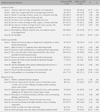Abstract
Purpose
The purpose of this study was to compare health promotion lifestyles and self-esteem of nursing students in Korea and China.
Methods
With a descriptive comparative design, a total of 305 Korean and 317 Chinese nursing students were recruited. The health promotion lifestyles was measured by Walker's Health-promoting Lifestyle Profile II instrument and self esteem was measured by Rosenberg's self esteem instrument. Data were analyzed by descriptive statistics and multiple regression.
Results
Korean students showed significantly higher levels of health responsibility, nutritional habit, interpersonal relations, and spiritual growth compared with Chinese students, but physical activity was higher in Chinese students. The factors influencing health promotion lifestyle were self-esteem, nation, and satisfaction of school life. The levels of health promotion lifestyles positively correlated with self-esteem in Korean and Chinese nursing students.
Figures and Tables
Table 2
Comparison of Health Promotion Lifestyle and Self-esteem between Korean and Chinese Nursing Students (N=622)

References
1. Al-Kandari F, Vidal VL. Correlation of health-promoting lifestyle, enrollment level, and academic performance of college of nursing students in Kuwait. Nurs Health Sci. 2007; 9:112–119.

2. Arkin M, Sultan A, Mahmut H. The investigation on nutrition knowledge and attitude behavior of Xinjiang university students. J Xinjiang Univ Natural Sci Edition. 2008; 25(4):474–479.
3. Chen R. Current conditions and prospects of health promoting schools activity. Chin J Sch Health. 2004; 25(1):114–116.
4. Choi EY. Study on determinants of health promoting behavior in nursing students. J Korean Acad Soc Nurs Educ. 1999; 5(2):347–358.
5. Chon SJ, Kim Kang MJ, Park JS, Lee MH, Cho KS, Kim HK, et al. Adult health nursing. Seoul: Hyunmunsa;2005.
6. Chung MS. The relations of self-esteem, practical performance, and practical satisfaction in nursing students. Korean Acad Psychiatr Ment Health Nurs. 2009; 18(1):60–68.
7. Cui SM. A comparative study on the college adjustment and mental health of the university students of Korea and China. Seoul: Yonsei University;1999. Unpublished master's thesis.
8. De JC, Oh KO, Kim T. A comparative on the stress, coping method, and mental health of nursing college students in Korea and China. J Korean Acad Psychiatr Ment Health Nurs. 2008; 17(1):75–84.
9. Han MJ. Developmental study of death anxiety according to coping style, locus of control self-esteem. Korean J Psychol Gen. 2002; 21(2):179–198.
10. Hui WC. The health promoting lifestyles of undergraduatenurses in Hong Kong. J Prof Nurs. 2002; 18(2):101–111.
11. Hyun SK, Bae JH. The effect of physical activity on health-related self-efficacy and self-esteem in the older women. J Korea Sport Res. 2004; 15(6):1213–1222.
12. Jun BJ. Self-esteem: A test of its measurability. Yonsei Nonchong. 1974; 11:107–129.
13. Kim S. Factors affecting health promotion behaviors among Korean immigrants women at midlife. California, USA: University of California Los Angeles;2001. Unpublished doctorial dissertation.
14. Kim SL, Lee JE. Relationship among stress, coping strategies, and self-esteem in nursing students taking clinical experience. J Korean Acad Soc Nurs Educ. 2005; 11(1):98–106.
15. Kim YH, Jung MS, Lee JA. Study an health promoting behavior determinant of nursing students. J Korean Community Health Nurs. 2002; 16(2):286–303.
16. Lee JK, Han AK. The study on the relationship between social support, self-esteem and health promoting behavior among nursing students. J Korean Acad Adult Nurs. 1996; 8(10):55–67.
17. Lee MR. Determinants of health promoting lifestyle of college students. J Nurs Acad Soc. 1997; 27(1):156–168.

18. Lee RL, Yuen Loke AJ. Health promoting behaviors and psychosocial: Well-being of universitystudents in Hong Kong. Public Health Nurs. 2005; 22(3):209–220.

19. Park HS, Bae YJ, Jung SY. A study on self-esteem. self-efficacy, coping methods, and the academic and job seeking stress of nursing students. J Korean Acad Psychiatr Ment Health Nurs. 2002; 11(4):621–631.
20. Park MH. A Study on self-esteem and the health promoting behavior of nursing college students. J Korean Acad Adult Nurs. 1999; 11(1):96–106.
21. Park SJ. Predictive factors the health promoting behaviors of Korean students in China. Gwangju: Chonnam National University;2002. Unpublished master's thesis.
22. Pender NJ. Health promotion in nursing practices. Toronto, Ontario: Prentice Hall Canada;1996.
23. Pender NJ, Walker SN, Sechrist KR, Framk-Stromberg M. Predicting health promoting lifestyles in the workplace. Nurs Res. 1990; 39(6):326–332.
24. Rogenberg M. Society and the adolescent self image. Princeton. NJ: Princeton University Press;1965.
25. Ross L. The spiritual dimension: its importance to patients' health, wellbeing and quality of life and its implicationsfor nursing practice. Int J Nurs Stud. 1995; 32:457–468.
26. Steptoe A, Wardle J, Cui W, Bellisle F, Zotti AM, Baranyai R, Sannderman R. Trends in smoking, diet, physical exercise and attitude toward health in European university students from 13 countries, 1990- 2000. Prev Med. 2002; 35:97–104.

27. Walker SN, Hill-Polrecky D. Psychometric evaluation of the health promoting lifestyle profile-II. In : Proceedings of the 1996 Scientic Session of the American Nurse Association's Council of Nurse Researchers; Washington DC: 1996. p. 110.
28. Walker SN, Sechrist KR, Pender NJ. The health promoting lifestyle profile: Development and psychometric characteristics. Nurs Res. 1987; 36:76–81.
29. Yoon JY. Effects on self-respect and school life adaption by each different degree of students' physical activities in an elementary school. Gongju: Gongju University of Education;2009. Unpublished master's thesis.
30. Zhao ZB, Li XM, Wang ZY. Analysis on the current situation of college students religious value and countermeasures to the positive changes. J Hebei Normal Univ Sci Technol (Soc Sci). 2007; 6(1):37–41.




 PDF
PDF ePub
ePub Citation
Citation Print
Print







 XML Download
XML Download